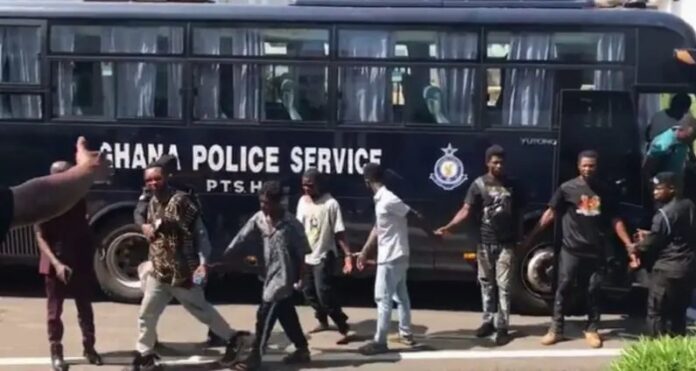“Injustice affects us all, directly or indirectly. We can’t afford to be indifferent, thinking ‘it’s none of my business.’
Today’s silence ensures tomorrow’s isolation. When we don’t stand up for others, who will stand up for us?
The detention of over 40 Democracy Hub demonstrators in Ghana raises questions about the government’s commitment to democratic norms, citizen rights, and transparency.
Similar instances occurred throughout past regimes, indicating a troubling trend. The government’s priorities appear to favor repressing dissent, endangering fundamental liberties and democracy.
Do we have to keep doing this? Calls for responsibility, transparency, and justice are growing, with many urging the Attorney General to free the protestors.
Although some isolated incidents of disorder may have occurred during the protests against illegal mining and economic mismanagement, law enforcement’s forceful response, as well as the events surrounding the protesters’ arrest, detention, and remand, speak negatively about the government’s commitment to democratic values.
According to reports, the protesters were apprehended in Accra for a variety of reasons and transported to police custody, where they were separated into groups and kept without cause. But reported manhandling is quite awful. These people are speaking up for all of us, including the police officers.
The apparent restriction on access to legal help was particularly concerning because it violated their fundamental rights.
While it is understandable that the authorities have a responsibility to maintain public order and address any unlawful behavior, the way the Democracy Hub protesters were handled raises concerns about whether the government’s priorities are more focused on suppressing dissent than upholding the democratic principles outlined in Ghana’s constitution.
We ought to blame politicians, not police officers, for such problems. Dr. Dampare has led the Ghana Police Service to professionalism, but political involvement is holding them back. Allow police to operate independently to ensure effective law enforcement.
The President and Vice President oversee policy and set the tone for law enforcement’s response to protests. Their leadership’s approach to public dissent and transparency raises concerns.
To some extent, the police observed the rules, but the current government appears to prioritise crushing opposition over upholding democratic standards.
The President and Vice President’s apparent secret motives, as well as their handling of the protests, demand further examination.
It is critical to realise that the demonstrators’ complaints, such as the government’s alleged mishandling of the illegal mining crisis and broader economic issues, are valid and should be taken seriously.
Political leaders must take a more proactive and inclusive approach to engaging with civil society organizations and resolving their concerns. Using heavy-handed methods such as arrests and detention is counterproductive and undermines the government’s credibility and authority.
These force should be directed to the Galamsey sites not the poor Ghanaian who is seeking accountability.
The erosion of fundamental rights, such as freedom of assembly and expression, might have serious consequences for Ghana’s democracy.
Political leaders, law enforcement agencies, and the judiciary must uphold openness, accountability, and the rule of law. Failure to do so not only diminishes the state’s legitimacy, but also raises societal tensions. And that will not be very dangerous for Ghana.
All parties, including the government, civil society, and the media, must collaborate to find constructive solutions that address the main causes of public discontent while protecting all people’ fundamental rights and freedoms.
Every demonstration may cause minor disruptions, but they should not justify the treatment seen in the present instance, which can be viewed as an act of intimidation. The system looks to be built expressly to silence dissenting voices rather than protect individuals’ rights.
At this point, the Attorney General should consider issuing a nolle prosequi to liberate these people. Continued confinement serves no purpose other than to tarnish the reputation of the Akuffo Addo – Bawumia administration.
Truth and fairness are universal standards that everyone should follow.
The entire world is watching. Remaining silent in the face of injustice because it does not directly affect us goes against the nature of mankind.
It is our shared responsibility to fight for truth and justice, as we may one day seek help.
We need to come together, speak up for one another, and fight for what is right. Stand up for justice because it is our duty to each other. Truth and Justice Lives through us all.

